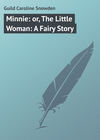Buch lesen: «Violet: A Fairy Story»
VIOLET: A FAIRY STORY
CHAPTER I.
VIOLET'S HOME
Once there was a gardener who lived in an old hut of a house, with one table inside, and some rough stools, and a large box that served for a bed, all of which he had made himself.
There was one window; but when it stormed the rain beat in so that the old lady, his wife, had to pin her shawl against it, and then the whole house was dark as night.
Every body thought these people poor except themselves; but they had one treasure which seemed to them better than a whole mountain of gold and all the splendid houses and gay carriages in the world. This was their little daughter Violet, whose presence in their home made it beautiful and stately, and whose absence, they thought, would have made a palace dull.
Violet was not as beautiful as some children. She was pale and slender, and her soft, light hair did not curl in ringlets, but floated over her shoulders like a golden veil. But O, she had such beautiful eyes! They were large, and so bright and clear, and such a deep, deep blue! Sometimes they made you think of a brook in the shady wood when gleams of sunshine have found their way to it; sometimes they were like nothing so much as the violets that grew beside the doorway of her own father's hut.
The old man had, besides his daughter, a garden, which was dear to him; and well it might be, for in summer it did one's eyes good to look at the blossoms all tangled together, and sprinkled over with great drops of pearly dew. Roses there were, and lilies, and fox-gloves, and mignonette, and a great many other flowers that had long names, which Violet could not remember. Then there were long, neatly-kept beds of vegetables and sweet herbs, which Reuben – for that was the gardener's name – carried to market.
Now, while Reuben was digging his vegetables, his wife and Violet would gather the prettiest flowers and buds, and tie them into bouquets with so much taste that soon the old gardener became famous for his flowers, and many rich people sought him out, promising to buy all he would bring to their houses.
Flowers only grow in summer time; and all the year round people must eat, and drink, and wear clothes; and then Reuben had to pay rent for his garden; so, notwithstanding their industry, Violet's friends were poor.
But they were happier than a great many rich people, and certainly loved Violet as well as though she had been a queen. They were so kind to her that sometimes the little girl thought, if there were such beings as fairies, they must look into her heart every day, find out her wishes, and tell them to her good parents.
Between you and me, there were two fairies – one named Love and the other Contentment – that lived all the time in Reuben's hut; and though Violet had never seen their faces, and did not even know their names, they were always doing something for her. It was because these excellent friends had touched her coarse garments that they looked fine and soft as velvet to her eyes; it was because they never left the old black hut that it looked so clean and sunny – cheerful as a palace.
You may wonder, if these fairies were so powerful, why they didn't have a palace of their own; but you must remember directly they enter a place it becomes a palace; and besides, Violet possessed a charm so powerful that even the fairies could not fly away unless she gave them leave; and yet – wasn't it queer? – she did not know this herself.
CHAPTER II.
STRANGE PLAYFELLOWS
Violet's birthday was very near; but she had forgotten all about it, birthdays came so far apart in her happy life. From morning until evening seemed long enough for a year to her; she found so much work to do, and such beautiful walks to take, and had so many playfellows, to say nothing of the two good fairies that always watched over and followed her.
Perhaps you wonder how the little girl found friends, living as she did away out in a lonesome field among the mountains. She could have described her pets to you better than I can, because the fairy Love dressed them up for her in jewels and rainbows, while to others they were only toads, and snakes, and flies, and trees, and brooks, and clouds.
Funny playfellows, you will think. There was one good thing about them – they never quarrelled or used bad words; and then it was sport for Violet, after her work was finished, to scamper away with them.
But if she ran ever so fast, the fairy Love always kept up with her; and it is well she did; for if she had staid at home, or fallen into a pit on the way, all Violet's dear playfellows would have changed in an instant – have grown ugly and coarse, and, what is worse, she would have trodden on them and crushed their wings – by mistake, I hope, for she never had been so wicked; and Violet herself would have changed into a little peevish girl, with a sickly face and loose yellow hair, and wearing a dress so coarse and rough you would not give it to a beggar child.
But Violet kept the charm locked safe in her heart, and therefore, wander wherever she would, the fairies had to follow. They were up with her early in summer mornings, for she loved dearly to watch the sun rise. She would climb a hill, at the foot of which Reuben's hut was built, and all alone up there, close, she thought, to the soft, rosy sky, would wait and watch, and at last clap her little hands for joy when the great golden sun came in sight above the woods. She would stand on tiptoe, and laugh aloud when she saw the shadows fly away, like frightened birds, before the sunshine, which flooded all the valley now, and which lay upon the beautiful wreaths of mist that went curling up to meet it from the ponds and brooks, brightening them to dazzling whiteness – so like the clouds in heaven that Violet half believed the earth about her was beautiful as that far-off blue sky.
So it would be if every little girl and boy kept two good fairies, like Love and Contentment, flying about with them.
How the grass glittered with dew! how the slender wild flowers were bowed down with its weight! – pearl and diamond beads strung all along the stems, and edging every petal. Children who keep in bed until eight o'clock know very little about the beauty of summer mornings. Perhaps, even if they did arise in time, they would be afraid of wetting their shoes in the grass; but Violet was very poor, you know, and never wore a shoe in her life, and lived out of doors so much that she was not in the least delicate.
As soon as the sunshine had crept near their nests among the green boughs of the wood, all the wild birds began to flutter about and sing such loud, clear, sweet songs that Violet could not help joining the chorus; and any one else would have known that fairies Love and Contentment were singing loudest of all. Violet heard their music, but supposed it came from the birds. How she wanted to fly away with them, up among the beautiful rosy clouds! but Love whispered in her ear, —
"Won't your mother want you, little girl, at home? Cannot you help her there?" and just then a bird fluttered away from a dew-wet bough, dashing a whole shower of drops in Violet's face. Instead of being angry, she laughed, and shouted, —
"Do it again, bird. If I can't fly away with you, you may wash my face before you go. Do it again."
But the bird was soon out of sight among the clouds, and Violet, with these pearly dewdrops clustering in her golden hair, went dancing down the hill.
CHAPTER III.
THE MOUNTAIN BROOK
Close beside the pathway ran a little murmuring brook, foaming and sparkling over its rocky bed, gliding just as merrily through the dark shadows as when its course lay open to the sun. It seemed as if fairy Contentment must have bathed in it, or planted some of the flowers along its brink; never was there a merrier little stream.
"I know what you're singing about," said Violet; "I know, Mr. Brook; you're trying to make me think you can run down the hill faster than any one else. Let us see;" and away she flew, and away the brook went after her, and by her side flew the fairies, and over her head the birds – all singing, "Success to Violet!" while the leaves "clapped their little hands" in favor of their friend the brook, and the young birds looked over the edge of their nests to find out what in the world this stir could be about.
Nobody ever knew which won the race. Up in the clouds the birds sang, "Good, good, good; it was Violet, Violet!" while the leaves whispered, "No, no, no, no; it was the brook!" But Violet and the brook were as good friends as were the birds and trees; so they all laughed together, instead of quarrelling.
When Violet reached home her breakfast was ready, and she sat down on the doorstep with her tin porringer of bread and milk. She was so hungry that it tasted better than a great many nicer breakfasts which have been eaten from silver cups; but, hungry as she was, she did not forget her kitten, who came, saying, plainly as she could purr, "Leave a little for me."
Violet had found out that it makes one quite as happy to be generous as to eat a good breakfast, and kitty had her share. Then she washed her porringer, hung it up in the sun to dry, and ran out in the garden, where her mother was picking flowers, whole baskets full of them, for the market, and told Violet to look among the thickly-clustering leaves of her namesakes, and gather all the blossoms she could find.
She found a whole apron full, white and blue violets, single and double ones; these she tied in bunches, with a few bright green leaves around each bouquet. The whole garden was scented with their fragrance, and Violet thought them the prettiest flowers in the world, as well as the sweetest, and wished in her heart that she could, just once, have one of these whole bunches for her own.
While she knelt on the ground admiring her lovely flowers, and wishing they need not all be sent away and sold, the fairy Love flew to her mother's side, and whispered in her ear all that Violet was thinking about. Then her mother remembered that to-morrow would be Violet's birthday, and on that occasion she never forgot to give her a present. But about this I must tell in another chapter.
CHAPTER IV.
TOADY
Violet passed such long, long, busy days, talking all the time to her mother, her kitten, her toads, or the birds that alighted now and then upon a bush, and sang to her while she worked; for Violet's mother, though she gave her plenty of time to play, had taught her little girl to sew and read.
She might have forgotten to do this amid all her own hard work; but fairy Contentment whispered in her ear that, unless Violet became useful and industrious, she must fly away, never to return; and Love, close by, sang, "See – I have brought her these books; and I'll make the learning easy."
I told you that some of Violet's playfellows were toads – the same ugly brown toads you have seen hopping about your own garden walks. You must not think they were ugly to her; for, soon as they came in sight, it always happened that the shadow of Love's purple wings would fall upon them, and then their brown backs changed to crimson and violet, and the poisonous-looking spots became jewelled studs; and I will not say they were very graceful pets even then; but Violet loved them, and they loved her.
This is the way their acquaintance began: It was a hot day – blazing hot; so light too – not a shadow to be seen. Violet had been in the garden at work, and, as she hastened homeward through the scorching sun, almost fell over a great toad, that had been crossing the path, but was so dusty she had mistaken him for a stone or a ball of earth.
She stooped to see if she had injured him, and patting the toad's back, said, —
"You poor little dirty fellow, don't you know enough to keep out of the sun and dust?"
Toady looked up at her as if he would answer if he did but know how to talk; he only opened and shut, opened and shut, his great wide mouth; but Violet understood very well what he meant by this; for the fairy Love teaches a language that is not set down in books or studied in colleges. I have known of great scholars, who could talk in twenty or thirty different tongues, and who yet knew less about this language of Love, which is the very best in the whole wide world, than our poor little barefooted Violet.
"You're thirsty, are you, toady?" said she; "stand still, and I'll give you a drink."
The toad opened his mouth again, and Violet poured over him a few drops she had left in her watering pot. She was half afraid he would not be very well pleased with such a showering; but there he stood, stock still, blinking his round red eyes, and opening his mouth at her as if he would say, "More – more!"
"Well, wait," she said, laughing; "I'll go to the brook and bring you more water in welcome, just for the sake of seeing your face clean once."
Away she ran, and toady not only waited for her, but, when she came back, there, one on each side of him, were two smaller toads – the three ranged in a row, looking so sober and funny that Violet laughed louder than ever.
She sprinkled the poor dusty toads all over with cool, bright water from the mountain brook; and when they had enough, they began to shake their heads and hop away, without even saying, "Thank you," and hid themselves in the grass.












